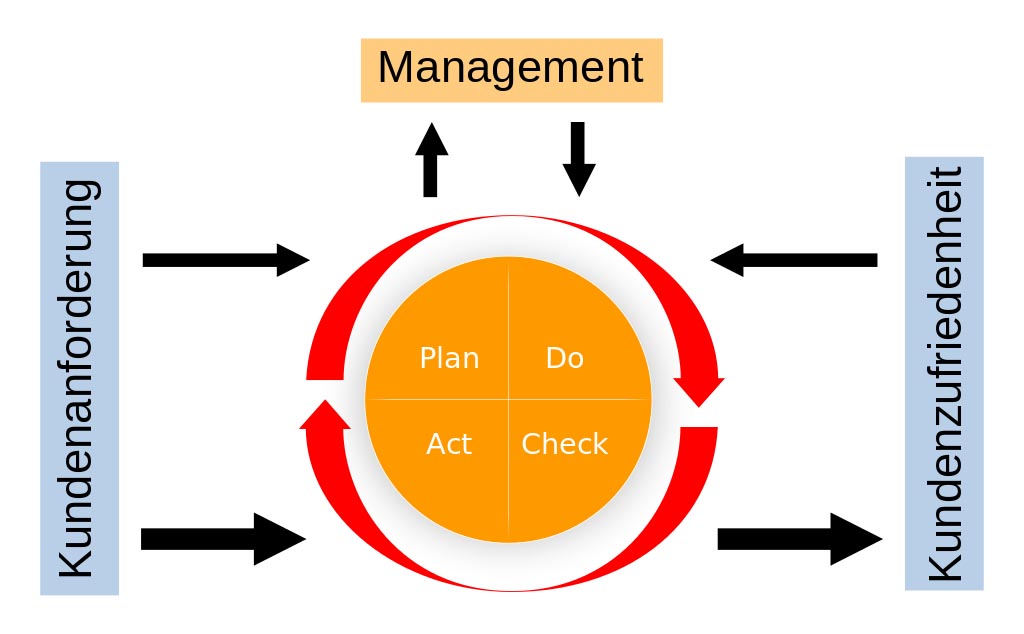Total quality management (TQM) is a philosophy applied to the actions of organizations, customers, and suppliers. It deals with implementing concepts such as customer satisfaction feedback, continuous process improvement, reliability engineering, etc. This article has compiled a list of 8 effective total quality management systems.
1. Management Commitment
One of the most important issues in Total Quality Management is management commitment. It helps all employees to understand the importance of quality and how it can improve their working resources. Management commitment plays an important role in defining the quality assurance objectives, customer satisfaction needs, and quality improvement initiatives. It is an important factor in creating an environment in which total quality can prosper.
Management commitment is the top-most requirement of TQM. If management does not show its commitment to TQM, then there are no possibilities that the employees will show any interest in TQM. Management commitment includes planning, design, monitoring, and controlling quality, product, or service by top-level management.
2. Process Improvement
Another important factor in understanding effective total quality management is process improvement. This means that a business or a company should work continuously to improve all its processes and activities. This is done by setting goals and objectives, planning, performing measurements, and following up. It also involves using various improvement tools such as audits, 5S, DOE’s and so on. All this will help the organization to attain a competitive edge.
3. Employee Involvement
With the help of total quality management, employee involvement is one of the most important aspects. It helps in creating an environment where employees can contribute their best to the organization. To achieve the best results, employees should be well equipped with all the necessary knowledge and skills.
Employee involvement is done by conducting training programs. They should perform their tasks with better quality; if they are well trained to manage their job responsibilities. They should also be involved in the office’s day-to-day operations; for example, they should take care of the paperwork. There should be certain responsibility given to the employees to become aware of their roles and responsibilities.
4. Communication
Communication is important in TQM. One should define quality objectives, specify why problems occur and how they can be resolved. There should be discussions on the results of measurement and the quality indicators. This should be done through regular meetings, proper communications, and feedback.
Information such as quality policy, objectives, and measurements must be updated regularly to update everyone.
5. Standardization
Standardization is a key aspect of total quality management. It helps in minimizing the flow of defective products and also reduces labor costs. In TQM, there should be a consistent standard to use quality procedures. For example, the use of automation such as SMS software ensures quality by following the same standard procedure to deliver consistent quality service every time.
Another aspect of standardization is quality planning. A standard plan for each product and process should be created to ensure that all employees follow the same procedure. There should also be a standard operating procedure (SOP) available at all workplaces.
6. Self-Audit
There must be an audit done once a year by the management and supervisors. They must check the quality, costs of production, and customer satisfaction. This is a process of self-assessment, analysis, and improvement. This information can then be used to improve product or service quality.
7. Continuous Improvement
This is one of the fundamental factors in total quality management. Organizations should always try to improve their products or services. If they fail to do so, then competitors will leave them behind very soon. Organizations should reduce costs, scrap certain activities that do not offer good results and make available customer service facilities 24×7.
8. Customer Satisfaction
Customers are the most important part of the company. Total quality management focuses on customer satisfaction. So, organizations should focus on improving their business practices to fulfilling their customers’ needs. They must design their products according to the demands of the customers. This will help them gain a competitive advantage.
Organizations should also strive to reduce the number of defects. They must be able to recognize problems and resolve them in time.
Conclusion
Total quality management is important for organizations, business houses, and corporate houses. It helps in reducing costs, improving product quality, achieving customer satisfaction, and increasing productivity.

